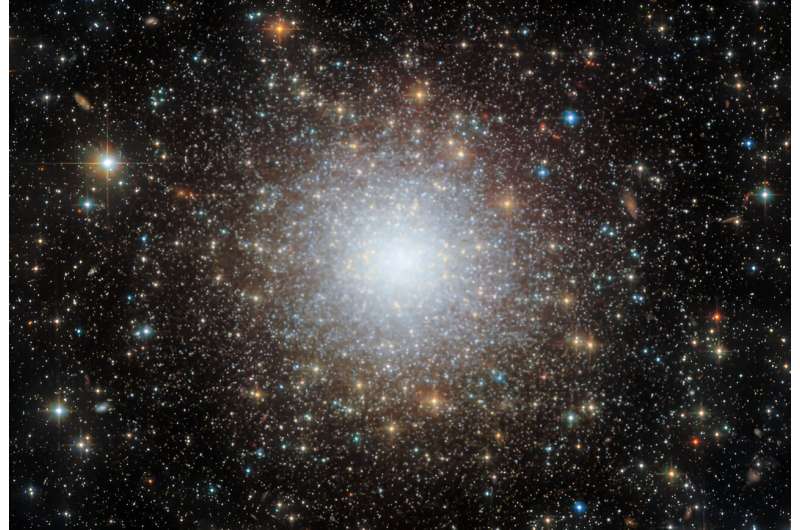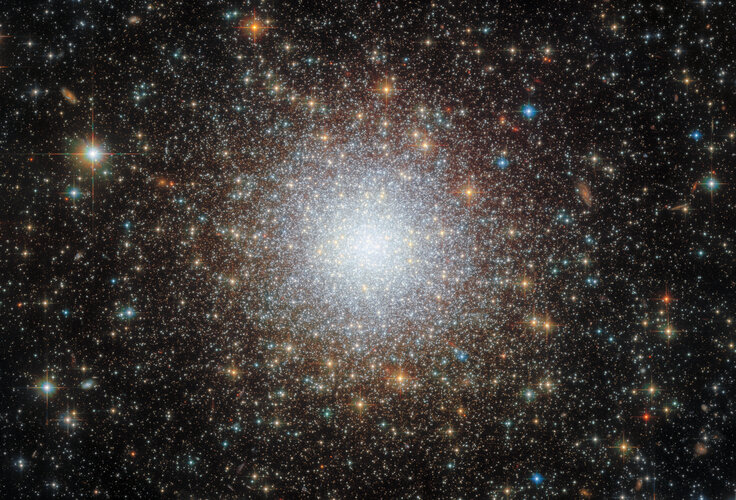Three satellites presumed lost in Transporter deployment malfunction
Friday, 08 December 2023 23:03

U.S. Space Force activates new unit to support operations in Europe and Africa
Friday, 08 December 2023 22:13

Experts raise concerns about U.S. commitment to GPS modernization
Friday, 08 December 2023 21:12

Image: Hubble captures a cluster in the Large Magellanic Cloud
Friday, 08 December 2023 16:34
This striking Hubble Space Telescope image shows the densely packed globular cluster known as NGC 2210, which is situated in the Large Magellanic Cloud (LMC). The LMC lies about 157,000 light-years from Earth and is a so-called satellite galaxy of the Milky Way, meaning that the two galaxies are gravitationally bound. Globular clusters are very stable, tightly bound clusters of thousands or even millions of stars. Their stability means that they can last a long time, and therefore globular clusters are often studied to investigate potentially very old stellar populations.
In fact, 2017 research using some of the data that were also used to build this image revealed that a sample of LMC globular clusters were incredibly close in age to some of the oldest stellar clusters found in the Milky Way's halo.
Northrop Grumman tests new solid rocket motor technologies
Friday, 08 December 2023 14:06

Week in images: 04-08 December 2023
Friday, 08 December 2023 13:10
Week in images: 04-08 December 2023
Discover our week through the lens
GAO report recommends FAA evaluate launch mishap investigation procedures
Friday, 08 December 2023 11:26

Space Systems Command and SpaceX Gear Up for USSF-52 Falcon Heavy Mission
Friday, 08 December 2023 10:13 Space Systems Command (SSC) and SpaceX are making final preparations to launch the U.S. Space Force (USSF)-52 mission into orbit. The Falcon Heavy mission is set to launch during a ten-minute window that opens Dec. 10 at 8:14 p.m. Eastern (5:14 p.m. Pacific) from the historic Launch Complex (LC)-39A at NASA's John F. Kennedy Space Center in Florida
USSF-52 is tasked with carrying out the s
Space Systems Command (SSC) and SpaceX are making final preparations to launch the U.S. Space Force (USSF)-52 mission into orbit. The Falcon Heavy mission is set to launch during a ten-minute window that opens Dec. 10 at 8:14 p.m. Eastern (5:14 p.m. Pacific) from the historic Launch Complex (LC)-39A at NASA's John F. Kennedy Space Center in Florida
USSF-52 is tasked with carrying out the s Hearing 'The Whole Sky' with Quasar Sense a Game Changer for Milspace
Friday, 08 December 2023 10:13 Quasar Satellite Technologies has introduced Quasar Sense, a novel tool in space domain awareness (SDA) for American defense, intelligence, and national security sectors. This innovative technology allows for the simultaneous tracking and characterization of over 30 satellites, marking a significant advancement in the field.
Quasar Sense utilizes more than 30 steerable beams from a digital
Quasar Satellite Technologies has introduced Quasar Sense, a novel tool in space domain awareness (SDA) for American defense, intelligence, and national security sectors. This innovative technology allows for the simultaneous tracking and characterization of over 30 satellites, marking a significant advancement in the field.
Quasar Sense utilizes more than 30 steerable beams from a digital Pacific Defense Secures Phase II Contract for Advanced Cislunar Space Sensor
Friday, 08 December 2023 10:13 Pacific Defense, a leader in Modular Open Systems Approach (MOSA) technology, has announced a significant development in cislunar space situational awareness (SSA). The company has been awarded a $9.4 million Phase II contract by the Space Control Technology Branch of the Air Force Research Laboratory (AFRL) to complete the development of a low size, weight, and power (SWaP) sensor. This sensor,
Pacific Defense, a leader in Modular Open Systems Approach (MOSA) technology, has announced a significant development in cislunar space situational awareness (SSA). The company has been awarded a $9.4 million Phase II contract by the Space Control Technology Branch of the Air Force Research Laboratory (AFRL) to complete the development of a low size, weight, and power (SWaP) sensor. This sensor, China's Quest for Space-Based Solar Power: A Clean Energy Revolution
Friday, 08 December 2023 10:13 Amid global efforts to transition from fossil fuels to cleaner energy sources, Chinese scientists and engineers are pursuing an innovative solution-harnessing the abundant energy of the sun in space and beaming it back to Earth. Multiple teams in China are currently dedicated to developing the necessary technologies for constructing and operating a space-based solar power facility. This ambitiou
Amid global efforts to transition from fossil fuels to cleaner energy sources, Chinese scientists and engineers are pursuing an innovative solution-harnessing the abundant energy of the sun in space and beaming it back to Earth. Multiple teams in China are currently dedicated to developing the necessary technologies for constructing and operating a space-based solar power facility. This ambitiou Iran hails capsule launch as step towards human spaceflight
Friday, 08 December 2023 10:13 Iran has launched a capsule designed to carry living beings in a step towards sending astronauts into space, state media reported Wednesday - the latest test of aerospace technology criticised by the West.
The capsule was successfully sent up to a height of 130 kilometres (80 miles), the IRNA news agency quoted Telecommunications Minister Issa Zarepour as saying.
He said the launch of t
Iran has launched a capsule designed to carry living beings in a step towards sending astronauts into space, state media reported Wednesday - the latest test of aerospace technology criticised by the West.
The capsule was successfully sent up to a height of 130 kilometres (80 miles), the IRNA news agency quoted Telecommunications Minister Issa Zarepour as saying.
He said the launch of t To the moo-n: cow dung fuels Japan's space ambitions
Friday, 08 December 2023 10:13 Japan's space industry opened potentially an udder-ly new chapter on Thursday with a start-up testing a prototype rocket engine that runs on fuel derived purely from a plentiful local source: cow dung.
The experiment saw the engine blast out a blue-and-orange flame 10-15 metres (30-50 feet) horizontally out of an open hangar door for around 10 seconds in the rural northern town of Taiki.
Japan's space industry opened potentially an udder-ly new chapter on Thursday with a start-up testing a prototype rocket engine that runs on fuel derived purely from a plentiful local source: cow dung.
The experiment saw the engine blast out a blue-and-orange flame 10-15 metres (30-50 feet) horizontally out of an open hangar door for around 10 seconds in the rural northern town of Taiki. Ice's crucial role in planet and comet formation mapped by Webb
Friday, 08 December 2023 10:13 In a significant breakthrough, a Dutch-led international team of astronomers has harnessed the power of the James Webb Space Telescope to create the first comprehensive two-dimensional inventory of ice within a planet-forming disk surrounding a young star. The findings, published in the journal Astronomy and Astrophysics on December 6, open a new window into the crucial role of ice in the format
In a significant breakthrough, a Dutch-led international team of astronomers has harnessed the power of the James Webb Space Telescope to create the first comprehensive two-dimensional inventory of ice within a planet-forming disk surrounding a young star. The findings, published in the journal Astronomy and Astrophysics on December 6, open a new window into the crucial role of ice in the format 


